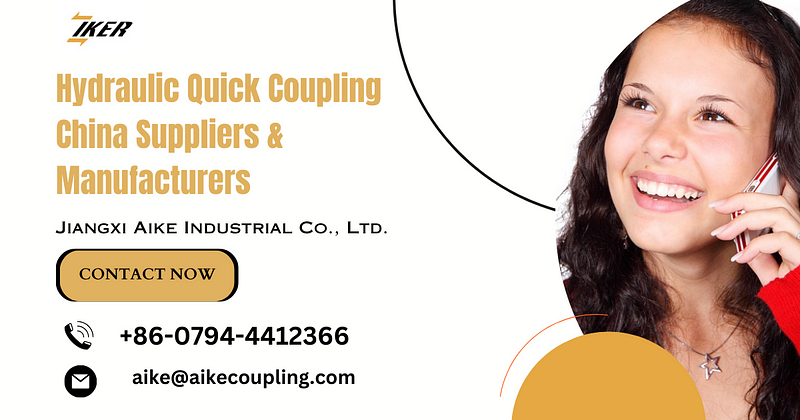
In the realm of hydraulic systems, the choice of coupling can significantly impact performance, reliability, and efficiency. Screw flat face couplings, known for their robust design and reliable sealing, are increasingly favored in various machinery applications across industries. These couplings offer distinct advantages that cater to the demands of modern machinery, ensuring seamless operation and enhanced productivity.
Screw flat face couplings represent a pivotal advancement in hydraulic technology, offering superior sealing performance and durability compared to traditional coupling designs. As machinery continues to evolve, the need for efficient and reliable hydraulic connections becomes paramount. This guide delves into the advantages of screw flat face couplings, highlighting their applications, benefits, and considerations for optimal usage in diverse machinery settings.
Understanding Screw Flat Face Couplings
Screw flat face couplings, also referred to as threaded flat face couplings, feature a flat mating surface with internal threads that engage with corresponding external threads on the opposite coupling. This design ensures a tight, leak-free connection that withstands high pressures and minimizes fluid loss during operation. The screw mechanism allows for secure attachment and detachment, making these couplings ideal for applications requiring frequent coupling and uncoupling.
Key Advantages of Screw Flat Face Couplings
1. Enhanced Sealing Performance
The flat face design of these couplings, combined with threaded engagement, provides superior sealing capabilities compared to other coupling types. This feature reduces the risk of fluid leakage, ensuring efficient operation and minimizing environmental impact.
2. Robust Construction
Screw flat face couplings are typically constructed from high-quality materials such as stainless steel or carbon steel, enhancing durability and resistance to wear under demanding conditions. This robust construction ensures long-term reliability and minimizes maintenance requirements, contributing to overall cost-effectiveness.
3. Compatibility with High Pressure
Designed to withstand high hydraulic pressures, screw flat face couplings maintain integrity and performance in critical machinery applications. They are suitable for hydraulic systems operating at elevated pressures, ensuring safety and efficiency in industrial operations.
4. Ease of Maintenance
The threaded connection of screw flat face couplings allows for straightforward maintenance and replacement procedures. This ease of maintenance reduces downtime and labor costs associated with servicing hydraulic systems, thereby optimizing operational efficiency.
Applications of Screw Flat Face Couplings
Screw flat face couplings find widespread use across various machinery and industrial applications:
- Construction Machinery: Used in hydraulic excavators, loaders, and cranes for connecting hydraulic hoses to power attachments and implement controls.
- Agricultural Equipment: Employed in tractors, combines, and harvesters to facilitate quick coupling of hydraulic tools and implements for field operations.
- Manufacturing and Processing: Integral to hydraulic presses, injection molding machines, and CNC equipment for efficient fluid transfer and control in manufacturing processes.
- Mining and Heavy Equipment: Utilized in mining trucks, drilling rigs, and hydraulic shovels for reliable hydraulic connections under extreme operating conditions.
Considerations for Choosing Screw Flat Face Couplings
When selecting screw flat face couplings for machinery applications, several factors should be considered:
Operating Pressure and Temperature
Ensure the couplings are rated for the maximum operating pressure and temperature of your hydraulic system to prevent performance issues and ensure safety.
Material Compatibility
Choose couplings made from materials compatible with the hydraulic fluid used in your machinery to avoid corrosion and degradation over time.
Size and Thread Type
Match the coupling size and thread type to your existing hydraulic components to ensure proper fitment and reliable performance.
Environmental Conditions
Consider factors such as exposure to chemicals, moisture, and abrasive materials in the operational environment to select couplings with appropriate durability and resistance properties.
Screw flat face couplings represent a cornerstone of modern hydraulic technology, offering superior sealing, durability, and reliability in machinery applications across industries. By understanding their advantages, applications, and key considerations outlined in this guide, businesses can make informed decisions to optimize hydraulic system performance, enhance productivity, and achieve operational excellence.
FAQs
1. How do screw flat face couplings prevent fluid leakage?
Screw flat face couplings utilize a flat mating surface and threaded engagement to create a tight seal, preventing fluid leakage even under high pressure conditions.
2. What maintenance practices are recommended for screw flat face couplings?
Regular inspection for wear, cleaning of mating surfaces, and lubrication of threads are recommended to ensure optimal performance and longevity of screw flat face couplings.
3. Are screw flat face couplings interchangeable with other coupling types?
While compatibility may vary, screw flat face couplings are generally designed for specific thread types and sizes, requiring matching components for proper operation.
4. Can screw flat face couplings be used in applications with high vibration?
Yes, screw flat face couplings provide secure connections that resist vibration, making them suitable for applications where equipment stability is crucial.
5. What advantages do stainless steel screw flat face couplings offer over other materials?
Stainless steel screw flat face couplings offer superior corrosion resistance and durability, making them ideal for harsh environments and extended service life.
